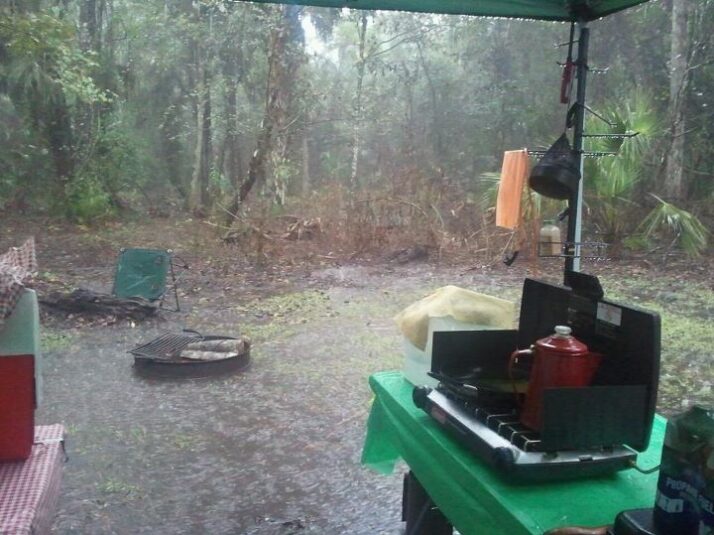Florida is a beautiful state with a lot to offer outdoor enthusiasts. However, it is important to be prepared for bad storms when camping or hiking in Florida.
About summer rains in Florida:
- Florida's rainy season runs from June to October.
- During this time, the state can receive an average of 4.5 to 6 inches of rain per month.
- The heaviest rains often occur in the afternoons and evenings.
- Summer rains are caused by the Intertropical Convergence Zone (ITCZ), which is a band of thunderstorms that forms near the equator.
The ITCZ moves north during the summer, bringing with it warm, moist air from the Atlantic Ocean. This air rises over the state, cools, and condenses, forming clouds and thunderstorms.
Summer rains are important for Florida's ecosystem. They help to replenish groundwater supplies, recharge aquifers, and support the state's diverse plant and animal life.
However, summer rains can also be a nuisance. They can cause flooding, power outages, and travel delays. It is important to be prepared for summer rains when planning to hike and camp in Florida.
Here are some tips for being prepared for bad storms:
- Check the weather forecast before you go. This will help you know what to expect and pack accordingly.
- Bring a rain jacket and pants. Even if the forecast is for sunny weather, it is always a good idea to bring rain gear.
- Bring a hat and sunglasses. The sun can be very strong in Florida, even on cloudy days. You will need them when the storm passes.
- Bring plenty of water and snacks. You may not be able to find food or water if you get caught in a storm.
- Be smart and let someone know where you are camping or hiking and when you expect to be back from your adventure. In case you are delayed for any reason you will know that someone knows you are not back and they will know to look for you.
Here are some tips on what to do if you are hiking in a bad storm:
- Find shelter. If you are in a forest, find a low-lying area with thick vegetation to take shelter under. If you are in an open area, find a ditch or other low-lying area to lie down in.
- Stay away from tall objects. Tall objects, such as trees and power lines, are more likely to be struck by lightning.
- Crouch down and cover your ears. If you are in an open area and you see lightning, crouch down and cover your ears. This will help to protect you from the shock wave of the lightning.
- Stay away from water. Water conducts electricity, so it is important to stay away from water during a lightning storm.
- If you are with a group, stay together. This will make it easier to find each other if someone is injured.
- Be patient. The storm will eventually pass.
Here are some additional tips for hiking in bad weather:
- Dress in layers. This will allow you to adjust your clothing as needed to stay warm or cool.
- Wear waterproof shoes or boots. This will help to keep your feet dry.
- Bring a rain jacket and hat. This will help to keep you dry and warm.
- Bring a first-aid kit. This will be helpful if you are injured.
Here are some tips for camping in a lightning storm:
- Avoid open areas. If you are camping in an open area, such as a field or a beach, find a nearby building or other shelter to take refuge in. If there is no shelter nearby, crouch down in a low-lying area, such as a ditch or a depression, and cover your ears.
- Avoid tall objects. Tall objects, such as trees and power lines, are more likely to be struck by lightning. If you are near a tall object, move away from it as quickly as possible.
- Stay away from water. Water conducts electricity, so it is important to stay away from water during a lightning storm.
- Do not use electronic devices. Electronic devices can act as lightning rods, so it is important to avoid using them during a lightning storm.
- Be patient. The storm will end, they always do, and you will have the task of drying out camp gear and clothing.
Here are some additional tips for staying safe in a storm:
- Do not try to drive through a flooded area when leaving your campsite or the trailhead. The water may be deeper than it looks and you could get swept away.
- If you are in a boat or kayak, stay away from the shoreline. The waves can be very strong and you could be swamped.
- Be aware of the signs of lightning. These include dark clouds, thunder, and lightning. If you see any of these signs, take shelter immediately.


